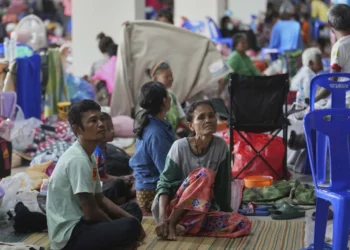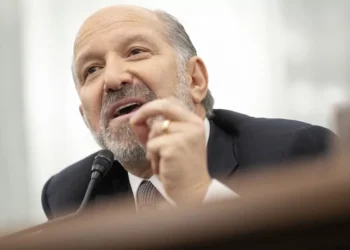Russia’s major overnight missile strike on Kyiv reflects Vladimir Putin’s desire to squeeze Ukraine and to divide the United States and Europe in their respective policies towards Russia.
The attacks, which predominantly targeted civilian residential apartment buildings, killed at least 21 people, including four children. At least one strike badly damaged the European Union office and British Council building in Kyiv.
Putin is sending President Donald Trump an unmistakable message. A KGB-style salute in the order of “I am neither afraid of your sanctions threats nor willing to give Ukraine any diplomatic breathing space. I dominate you, not vice versa.” As of publication, Trump’s only reaction to the attack has been limited to White House press secretary Karoline Leavitt. She says that the president is “not happy, but also not surprised.”
This is weak from a president whose political persona and associated diplomatic strategy in Ukraine both depend on his robust presentation of strength.
The contrast between how Putin and Ukrainian President Volodymyr Zelensky are treating Trump’s peace agenda is extraordinarily stark. Zelensky has accepted Trump’s call for bilateral talks with Putin, and has recognized the need for painful land swaps. He accepted Trump’s now-aborted call for an immediate ceasefire many months ago. Putin has rejected all of these demands. Instead, via these latest attacks, Putin is mocking the American president in the most blatant and brutal manner. Putin clearly believes Trump will continue to tolerate his rejection of any meaningful efforts towards peace.
And to be fair to the Russian leader, why wouldn’t he?
After all, Trump has repeatedly threatened to impose new sanctions on Russia over Putin’s anti-peace obstinacy. But with the exclusion of new tariffs imposed on Indian’s importation of Russian oil, Trump has backtracked every time. Why Trump has not imposed tariffs on China over its far greater imports of Russian energy supplies is unclear. What about other Russian energy importers such as Hungary and Turkey? Equally unclear is why Trump has not sanctioned the Russian central bank, limiting its access to foreign markets. These actions would greatly exacerbate Russia’s already significant economic strain, producing much increased pressure on Putin to pursue peace.
In addition, striking the European Union and British Council offices in Kyiv, Putin is also attempting to divide Trump from his European allies. With these attacks Putin is clearly taking advantage of Trump’s foolish utterance that he does not want to see World War III. Of course, no one wants to see World War III. But in constantly reminding Putin that he fears that the war in Ukraine risks that outcome, Trump only incentivizes Putin to engage in more brinkmanship in the interest of weakening his resolve to help Ukraine secure a just peace. What Trump should be doing is pursuing a just peace while constantly reminding Putin, as he has sometimes done, that the U.S. is ready to deter and defeat Russia across the spectrum of conflict.
Instead, gambling that Trump will not respond robustly to these attacks, Putin hopes that two consequences will follow. First, that Putin will assume even more latitude to engage in brinkmanship whenever Trump makes moves to support Ukraine or otherwise compel Russia to make new concessions. Second, that European allies will lose trust in Trump by increasingly doubting both his ability to stand alongside them as allies who have just suffered a de facto attack, and his willingness to punish Putin for his bloodletting of Ukrainian children.
DECODING TRUMP’S MILITARY BUILD UP AROUND VENEZUELA
Trump, therefore, has a decision to make.
He can use these attacks as an excuse to punish Putin with new sanctions. By doing so, he will educate Putin that Russia cannot use blackmail to dominate him and Ukraine. Alternatively, Trump can do nothing and accept that Putin will continue to play him for a weak pretender who lacks the resolve to advance his otherwise noble agenda for peace.
















